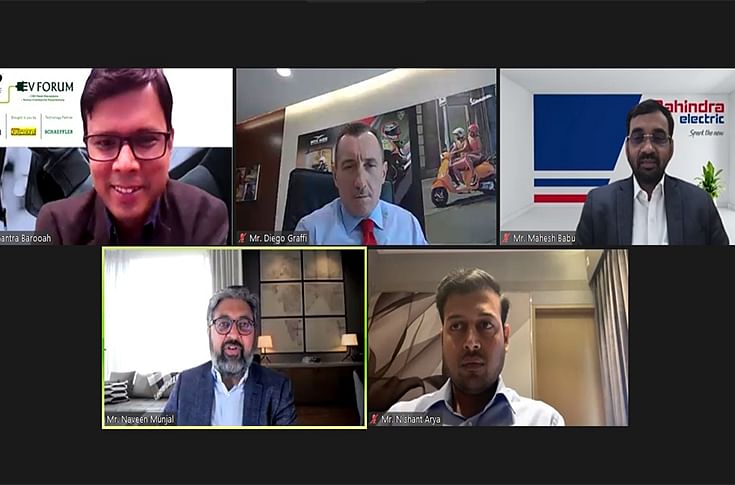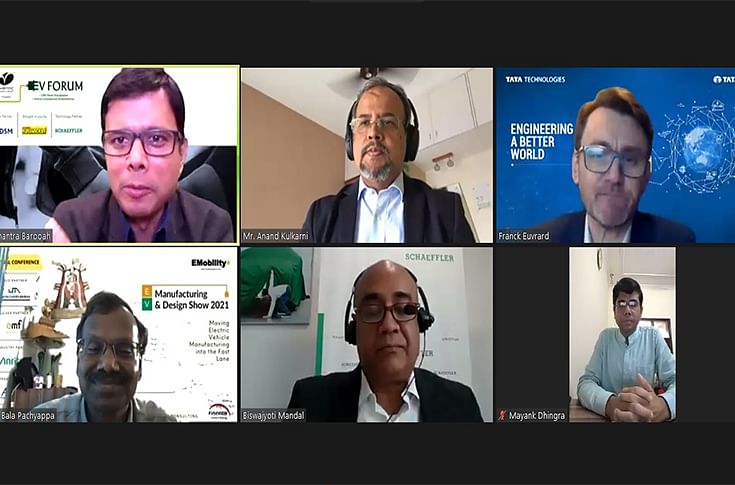EV Forum: Localisation and sustainable business model catalysts for faster EV adoption
Autocar Professional's 2-day EV Forum on the theme of 'Building a Sustainable EV Industry'.
Electric vehicles are increasingly been touted as a clean alternative to conventional vehicles. As petrol and diesel prices race towards the Rs 100/litre mark, the question is can electric vehicles offer a cheaper and greener alternative for future mobility needs.
It is exactly with these questions Autocar Professional decided to focus on the theme, 'Building a Sustainable EV Industry' with the ‘EV Forum' - a two-day virtual conference on the emerging EV industry on February 22 and 23.
Industry leaders representing OEMs, suppliers, charging infrastructure companies, start-ups, and government representatives share ideas on building a sustainable EV industry in India. The keynote address on Day 1 was delivered by Dr Andrew Palmer, Chairman, Switch Mobility. In a free-wheeling discussion with Autocar Professional’s Sumantra Bibhuti Barooah, he highlighted the gradual EVolution of the industry.
Dr Andrew Palmer: ‘Politicians aren’t capable of deciding what tech to use for clean air. As an industry we have to decide.’

Dr Andrew Palmer, Chairman, Switch Mobility kicked off the discussions in the EV Forum with some pertinent references to the agents of change in the automotive world today, “Changing customer dynamics is but one of the changes facing the auto industry. Tech, environmental considerations & legislation are all imposing change. Gen Z vehicle owners will lead the charge towards EVs more than any other generation."
Palmer considers the, “route to EV is perhaps more disruptive for auto industry than anything else. It opens the ‘Closed Shop’ to newcomers; the tech’s far simpler than the IC engine & EVs allow easier entry for the digital disruption led by tech.”
He believes that, “investment in transforming the portfolio to EV is enormous and will have a material impact on each car-makers bottom-line over the coming years – Some manufacturers for example have guided us to expect a 30 percent reduction in EBIT to pay for the investments.”
Global sales of electric cars accelerated fast in 2020, rising by 43 percent to more than 3 million, despite overall car sales slumping by a fifth during the coronavirus pandemic. Moreover, in the public transport space, forecasts indicate that approximately 40 percent of new city buses registered in Europe by 2025 will be BEV.
Palmer believes that in India too, the commercial vehicles segment, especially buses and logistics carriers will lead the race towards EV adoption, “India has a large domestic fleet and it needs to try tapping into the country’s talent pool. Legislation of the large fleets relatively easy. Therefore, I feel CVs and logistics industry will drive the move towards EVs. Clearly we see the move towards affordable electric vehicles.” He is confident that, “India can and will step up to the challenge; that it will take its place domestically and globally on the EV stage. Switch Mobility will source the majority of its components from India.”
The evolution of battery technology is another aspect that Palmer stresses on as the potential catalyst for faster EV adoption. He believes that this technology, “will evolve quickly through derivatives of Lithium-Ion and eventually to solid state by 2030. The journey to affordable and useable BEV’s is within sight.”
Though he expects a significant part of the automotive industry to shift towards electrification by 2030, he believes that this change should be more a function of market forces and gradual evolution rather than a legislative exercise, “Politicians aren’t capable of deciding what technology to use for clean air. As an industry we have to decide what tech we want to use – EVs, IC, hybrid, fuel cell. We can’t stand & wait or people less qualified than us will decide our future & that cannot happen.”
Sustainability and the ability to scale up therefore holds the key for future growth of EVs.
Sustainability and market outlook for EV players
This decade is going to be a really interesting one for all stake holders in the EV industry. The first panel on day one focussed on the ‘Sustainability and market outlook for EV players’. The list of speakers included

- Mahesh Babu, MD & CEO, Mahindra Electric and Chairman, Electric Mobility Group, SIAM
- Naveen Munjal, MD, Hero Eco Group and President, SMEV
- Diego Graffi, CMD, Piaggio Vehicles
- Nishant Arya, ED, JBM Group and Co-chairman, Sustainable Technology Development Committee, ACMA
Mahesh Babu, MD & CEO, Mahindra Electric and Chairman, Electric Mobility Group, SIAM says “India is at a tipping point, in terms of the growth in auto industry. Govt policy, industry interest and consumer support crucial for any new technology to succeed. EV has put digitisation to the forefront and brought about a definitive degree of affordability to the overall dynamics. Need to look at adoption at a large scale and futuristic policy for the industry to fly.”
However Mahesh Babu reiterates that it is important, “to make economically valuable business case for EVs- this when coupled with zero tailpipe emission leads to sustainable business model.”
While business model viability is crucial, there is also need to segregate the focus on various segments like two-wheelers, three-wheelers and buses followed by passenger vehicles depending on the degree of their maturity. He believes, this is where there is need for, “policy intervention to make electric buses economically viable. Need an ecosystem, policy framework and customer awareness program for better growth prospects for EV market.”
According to him, “customer apprehension another key hinderance impacting faster EV adoption. Adequate charging ecosystem crucial. Need to change the ecosystem in sync with customer requirement and product necessities.”
He sees, “need to work towards 30% EV adoption between 2025-2030. This will save 2 million oil barrels per day and will need 3-4 percent energy generation to meet the increased energy need.”
Naveen Munjal, MD, Hero Eco Group and President, SMEV also believes that, “Public transport and two-wheelers are going to become the foundation of the EV shift in India. These segments will give the much-needed volume boost.”
He pointed out that policy is not yet working to the extent it should have so suggests course correction is important. He recommends, “front loading FAME 2 immediately with what the customer is asking for. We must target a million unit for next three years and then taper subsidies gradually.”
He pointed out that, “Majority of electric 2W buyers (70%) are buying low-speed models & rest high-speed. We expect the low-speed user base will come down to 50% by 2026 and the city-speed user base increase by 10-15%."
Though he agrees with Palmer’s point on market evolution of EVs for greater adoption, he highlights the necessity to, “set end goals for effective EV adoption.”
Nishant Arya, ED, JBM Group and Co-chairman, Sustainable Technology Development Committee, ACMA too emphasised on the affordability aspect, “The total cost of ownership plays an important role in the shift towards new technology, like electrification. PLI schemes will boost localisation of various components involved in EV making. Role of digitisation is also crucial in EV evolution. Need to have a holistic picture to strike the right balance. Technology driving value is most important and how it impacts the total cost of ownership is critical.”
JBM has 500+ electric buses across India. He sees the, “component industry well poised for investment in EV space and are scaling it up at the moment.”
He pointed out that, “Affordability, comfort and safety are key factors along with localisation make up the EV ecosystem.”
Diego Graffi, CMD, Piaggio Vehicles too thinks that localisation in a key piece in the puzzle, “the real change needed for faster EV adoption is greater degree of localisation of EV components in India.”
He believes that, “We are at the verge of launching a new offering in the two-wheeler portfolio. India has unique opportunity, one of the biggest mobility market in the world, therefore it has huge potential to take a lead role in electrification of overall transportation sector. These factors will drive the growth of EVs in India, along with rising fuel cost.”
He explained that, “over next 3-5 years, expect cost of technology to impact pace of electric two-wheeler adoption. As cost of battery goes down, coupled with more localisation, we may see better adoption of electric two-wheelers.”
Indigenisation journey and the technology development roadmap

Localisation, therefore is going to be a key for sustainability of the industry. As electrification is considered to be the future of the automotive industry. Industry leaders are vocal about the need to embrace the technology and work towards a common goal and this was the essence of the next panel on Day 1 of the EV Forum, ‘Indigenisation journey and the technology development roadmap.’
The speakers for this panel included
- Anand Kulkarni, Product line director – Electric Vehicles and ALFA architecture, PVBU, Tata Motors
- Franck Euvard, Executive Vice-President, Global Engineering, Research and Development , Tata Technologies
- Biswajyoti Mandal, CTO, Schaeffler India
- Bala Pachyappa, CEO, Sodion Energy
Autocar Professional’s Mayank Dhingra moderated the panel.
Anand Kulkarni, Product line director – Electric Vehicles and ALFA architecture, PVBU, Tata Motors set the tone of the discussion with his opening remarks, “Indigenisation is also an exercise in understanding customer expectation & preferences better and delivering. Customers would happily accept EVs if they get better range & EV charging infra."
But creating scale is also about striking a judicious balance between common solutions and unique opportunities. Kukarni explains that, “If there are common components which be used across solutions & multiple segments then we should definitely look at options to achieve economies of scale. If the IP is owned by an OE, then it can be used in conjunction with suppliers.”
He reiterated the need to continue on the path of a deeper localisation and invest in the future with a long-term perspective. While he believes that ‘Lightweighting; and better-quality battery are key factors that can help improve efficiency of EVs at the moment, Kulkarni pointed out that more than the battery size, the ease of finding a battery charging infrastructure a bigger focus area, given customer trends, “95% people do not drive more than 50-60km a day. The debate is between faster EV charging & smaller batteries or huge batteries with more range. A reasonable range of 250-300km, with good EV infra, should be capable of handling most needs in India."
According to him an EV revolution is well on its way but, “there is need to embrace it in totality. Collaboration and need to join forces is important. India will need to devise its own unique solution to make the most of the opportunity.”
Franck Euvard, Executive Vice-President, Global Engineering, Research and Development , Tata Technologies to believes that, “Collaboration between different stakeholders is important in the evolution of the EV industry. Weight management and developing a specific platform are key areas of focus in terms of frugal engineering.”
He added that, “the huge number of startups in India will take lead in looking for frugal and local solutions in the development of new energy vehicles. Need to keep a close eye on market dynamics.”
Can battery swapping offer a solution and hasten the process of EV adoption> Euvard explained that there is, “need to balance alternatives depending on usage. Battery swapping could be an option for electric fleets with longer driving duration. But the process of swapping needs to be structured for it to function efficiently.”
Biswajyoti Mandal, CTO, Schaeffler India pointed out the importance “to go in depth into our EV technology roadmap for far reaching solutions. We need to take a longer time frame, 8-10 years in consideration.”
He added that there is, “Need to conceptualise local issues to better address the need for Indian market. Lean powertrain applicable for India that adds value in terms of cost and performance is important.”
He pointed out that, “Schaeffler’s recent experiments in India have revealed what has to be done on the EV front. We need to think of a long-term tech roadmap. There are also lot of answers in fuel cells which are not there in EVs."
Schaeffler has the option of two-speed gear boxes for users and customers. He highlighted that, “hybridisation will co-exist in India for the time being. Meeting CAFÉ III norms could be a challenge and hybridisation can help bridge this gap.”
Going forward, he explained how battery will emerge as the prime source of power to run the two-wheelers and passenger cars. In comparison, “the three-wheelers and buses & truck run for longer duration in comparison. Range will play a critical role in their business model. Battery size however may not be the only factor to decide that.”
Sodion Energy is taking key steps in addressing this crucial battery technology front, Bala Pachyappa, CEO, Sodion Energy explained that, “Sodium is one of the most abundantly available natural resources, particularly in sea water. Sodium-ion batteries can be produced in most countries, at far less cost that li-ion batteries. Sodium battery chemistry is also free of cobalt & nickel"
He pointed out that, “optimising efficiency crucial for business. Focus on 3-wheeler and 2-wheeler where we are targeting a low-cost safer alternative battery replacement options. Pricing an important element in Sodion Ion’s business model. Proto-cells ready and undertaking tests. Getting 120 watt hour per kg. “
The company is already supplying products to three German companies and believes that, “Developed equipment right from scratch to make our own manufacturing unit. Developing the ecosystem of suppliers is also important. Getting fund and machinery important consideration when you are thinking of localisation. “
Addressing the long-debated topic of localisation and customers acceptance to build scale and infrastructure for faster EV adoption, Bala signed off saying, “Indigenisation is like bringing up a new kid, need to address the environment around too. Technology Investment is a must in a technology business, trading never works. Have to take the risk to optimise opportunity in a technology business.”
Autocar Professional thanks all the panellists and participants for the lively and informative discussions and interactive sessions. A big thank you to the EV Forum sponsors Varroc, Associate Partner DSM and Technology Partner Schaeffler.
Read More
EV Forum: Adopting EVs a function of effective policy, implementation and better awareness
RELATED ARTICLES
Cosmo First diversifies into paint protection film and ceramic coatings
The Aurangabad, Maharashtra-based packaging materials supplier is leveraging its competencies in plastic films and speci...
JSW MG Motor India confident of selling 1,000 M9 electric MPVs in first year
The 5.2-metre-long, seven-seater luxury electric MPV, which will be locally assembled at the Halol plant in Gujarat, wil...
Modern Automotives targets 25% CAGR in forged components by FY2031, diversifies into e-3Ws
The Tier-1 component supplier of forged components such as connecting rods, crankshafts, tie-rods, and fork bridges to l...






 22 Feb 2021
22 Feb 2021
 14636 Views
14636 Views





 Autocar Professional Bureau
Autocar Professional Bureau




